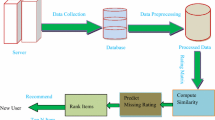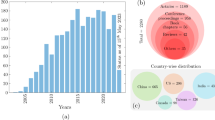Abstract
With the large-scale popularization of mobile terminals, crowd sensing technology has gradually replaced the existing static sensors with its efficient and low-cost advantages as an emerging data collection method. How to quickly allocate the sensing task to the optimal execution user under the premise of ensuring the perceived quality and reducing the cost is the focus of the research. In this regard, this paper proposes a Crowd sensing Sparrow Search Algorithm (CSSA) collaborative optimization recommendation method that combines fitness priority, collaboration, and intelligent optimization algorithms, and uses it for task allocation problems. Firstly, the concept of fitness is proposed to calculate the location, power, equipment and reputation of the perceived user, and analyze the matching degree of the user to the task. Secondly, according to the different fitness, the user is divided into explorers and followers, and the two cooperate to complete the perception task. Thirdly, in the process of solving the optimal task allocation scheme, CSSA intelligent optimization algorithm is used to simulate the process of users completing tasks, and the selected user results can be obtained after limited iterations. Through the comparative experiments of the proposed algorithm and other optimization algorithms in the same environment, the results show that it has higher performance in solving the task allocation problem.

















Similar content being viewed by others
Data availability
The datasets generated during the current study are available from the corresponding author on reasonable request.
References
Guo B, Wang Z, Yu Z et al (2015) Mobile crowd sensing and computing: the review of an emerging human-powered sensing paradigm. ACM Comput Surv 48(1):1–31
Ali A, Qureshi MA, Shiraz M et al (2021) Mobile crowd sensing based dynamic traffic efficiency framework for urban traffic congestion control. Sustain Comput: Inform Syst 32:100608
Boubiche DE, Imran M, Maqsood A et al (2019) Mobile crowd sensing–Taxonomy, applications, challenges, and solutions. Comput Hum Behav 101:352–370
Liu J, Cao H, Li Q et al (2018) A large-scale concurrent data anonymous batch verification scheme for mobile healthcare crowd sensing. IEEE Internet Things J 6(2):1321–1330
Sun J, Ma H (2014) Heterogeneous-belief based incentive schemes for crowd sensing in mobile social networks. J Netw Comput Appl 42:189–196
Gao H, Liu CH, Tang J et al (2018) Online quality-aware incentive mechanism for mobile crowd sensing with extra bonus. IEEE Trans Mob Comput 18(11):2589–2603
Wen Y, Shi J, Zhang Q et al (2014) Quality-driven auction-based incentive mechanism for mobile crowd sensing. IEEE Trans Veh Technol 64(9):4203–4214
Gao X, Huang H, Liu C et al (2020) Quality inference based task assignment in mobile crowdsensing. IEEE Trans Knowl Data Eng 33(10):3410–3423
Tu J, Cheng P, Chen L (2019) Quality-assured synchronized task assignment in crowdsourcing. IEEE Trans Knowl Data Eng 33(3):1156–1168
Song S, Liu Z, Li Z et al (2020) Coverage-oriented task assignment for mobile crowdsensing. IEEE Internet Things J 7(8):7407–7418
Chen J, Yang J (2019) Maximizing coverage quality with budget constrained in mobile crowd-sensing network for environmental monitoring applications. Sensors 19(10):2399
El-Ashmawi WH, Ali AF (2020) A modified salp swarm algorithm for task assignment problem. Appl Soft Comput 94:106445
Bhattacharjee S, Ghosh N, Shah VK et al (2018) QnQ: Quality and quantity based unified approach for secure and trustworthy mobile crowdsensing. IEEE Trans Mob Comput 19(1):200–216
Gao H, Liu C H, Tian Y et al (2017) Ensuring high-quality data collection for mobile crowd sensing. In: 2017 IEEE Wireless Communications and Networking Conference (WCNC). IEEE, p 1–6
Alsayasneh M, Amer-Yahia S, Gaussier E et al (2017) Personalized and diverse task composition in crowdsourcing. IEEE Trans Knowl Data Eng 30(1):128–141
Xue J, Shen B (2020) A novel swarm intelligence optimization approach: Sparrow search algorithm. Syst Sci Control Eng 8(1):22–34
Krishna MB, Lorenz P (2021) Collaborative participatory crowd sensing using reputation and reliability with expectation maximization for IoT networks. In: ICC 2021-IEEE International Conference on Communications. IEEE, p 1–6
Dande B, Chang CY, Liao WH et al (2022) MSQAC: Maximizing the surveillance quality of area coverage in wireless sensor networks. IEEE Sens J 22(6):6150–6163 (3–5)
Khan F, Rehman AU, Zheng J et al (2019) Mobile crowdsensing: a survey on privacy-preservation, task management, assignment models, and incentives mechanisms. Futur Gener Comput Syst 100:456–472
Lin Y, Cai Z, Wang X et al (2021) Multi-round incentive mechanism for cold start-enabled mobile crowdsensing. IEEE Trans Veh Technol 70(1):993–1007
Yang G, Wang B, He X et al (2021) Competition-congestion-aware stable worker-task matching in mobile crowd sensing. IEEE Trans Netw Serv Manage 18(3):3719–3732
Gong W, Zhang B, Li C (2017) Location-based online task scheduling in mobile crowdsensing. In: IEEE Global Communications Conference. IEEE, p 1–6
Li Z, Xu Z, Chen X (2019) Location-related online multitask allocation algorithm for mobile swarm intelligence perception. Comput Sci 46(6):102–106
Xiao M, Wu J, Huang L et al (2017) Online task assignment for crowdsensing in predictable mobile social networks. IEEE Trans Mob Comput 16(8):2306–2320
Wang E, Yang Y, Wu J et al (2017) An efficient prediction-based user recruitment for mobile crowdsensing. IEEE Trans Mob Comput 17(1):16–28
Tsai HC (2021) A corrected and improved symbiotic organisms search algorithm for continuous optimization. Expert Syst Appl 177:114981
Xiaofeng Z, Xiuying W (2019) Review on the research of grey wolf optimization algorithm. Comput Sci 46(3):30–38
Mirjalili S, Lewis A (2016) The whale optimization algorithm. Adv Eng Softw 95:51–67
Rashedi E, Nezamabadi-Pour H, Saryazdi S (2009) GSA: a gravitational search algorithm. Inf Sci 179(13):2232–2248
Gong W, Zhang B, Li C (2018) Location-based online task assignment and path planning for mobile crowdsensing. IEEE Trans Veh Technol 68(2):1772–1783
Azzam R, Mizouni R, Otrok H et al (2016) GRS: A group-based recruitment system for mobile crowd sensing. J Netw Comput Appl 72:38–50
Yang Z, Zhou C, Yuan S (2019) Task allocation based on discrete cuckoo search algorithm in mobile swarm intelligence sensing system.Comput Appl 39(9):2778–2783
Jiang W, Zhang W, Chen P et al (2021) Based on the number-sensitive task allocation method in IWOA group intelligence perception [J/OL]. Electronics 1(16):0372–2112
Anwar T, Uma V (2019) CD-SPM: Cross-domain book recommendation using sequential pattern mining and rule mining. J King Saud Univ Comput Inf Sci
Anwar T, Uma V (2019) Mrec-crm: Movie recommendation based on collaborative filtering and rule mining approach. In: 2019 international conference on Smart Structures and Systems (ICSSS). IEEE, p 1–5
Anwar T, Uma V, Srivastava G (2021) Rec-cfsvd++: Implementing recommendation system using collaborative filtering and singular value decomposition (svd)++. Int J Inf Technol Decis Mak 20(04):1075–1093
Yin B, Li J, Wei X (2021) Rational task assignment and path planning based on location and task characteristics in mobile crowdsensing. IEEE Trans Comput Soc Syst
Yang S, Wu F, Tang S et al (2017) On designing data quality-aware truth estimation and surplus sharing method for mobile crowdsensing. IEEE J Sel Areas Commun 35(4):832–847
Wang W, Duan X, Sun W et al (2021) Research on mobility prediction in 5G and beyond for vertical industries. IEEE, p 379–383
Liu S, Zheng Z, Wu F et al (2017) Context-aware data quality estimation in mobile crowdsensing. In: IEEE Conference on Computer Communications. IEEE, p 1–9
Acknowledgements
All the authors listed have approved the manuscript that is enclosed.
Funding
This present research work was supported by the National Natural Science Foundation of China (61403109, 61202458), the Specialized Research Fund for the Doctoral Program of Higher Education of China (20112303120007) and the Natural Science Foundation of Heilongjiang Province (LH2020F034).
Author information
Authors and Affiliations
Contributions
Jian Wang, Shuai Hao and Guosheng Zhao wrote the manuscript together.
Corresponding author
Ethics declarations
Ethical approval and consent to participate
I would like to declare on behalf of my co-authors that the work described was original research that has not been published previously, and not under consideration for publication elsewhere, in whole or in part.
Human and animal ethics
Not applicable.
Consent for publication
We would like to submit the manuscript entitled “CSSA-Based Collaborative Optimization Recommendation of Users in Mobile Crowdsensing”, which we wish to be considered for publication in “Peer-to-Peer Networking and Applications”.
Competing interests
No conflict of interest exits in the submission of this manuscript, and manuscript is approved by all authors for publication.
Additional information
Publisher's Note
Springer Nature remains neutral with regard to jurisdictional claims in published maps and institutional affiliations.
Rights and permissions
Springer Nature or its licensor (e.g. a society or other partner) holds exclusive rights to this article under a publishing agreement with the author(s) or other rightsholder(s); author self-archiving of the accepted manuscript version of this article is solely governed by the terms of such publishing agreement and applicable law.
About this article
Cite this article
Wang, J., Hao, S. & Zhao, G. CSSA-based collaborative optimization recommendation of users in mobile crowdsensing. Peer-to-Peer Netw. Appl. 16, 803–817 (2023). https://doi.org/10.1007/s12083-022-01444-y
Received:
Accepted:
Published:
Issue Date:
DOI: https://doi.org/10.1007/s12083-022-01444-y




